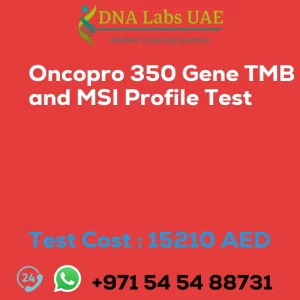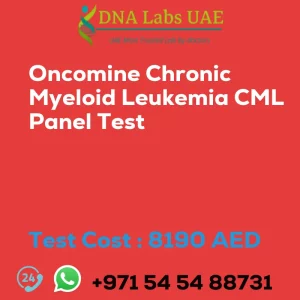ACUTE LYMPHOBLASTIC LEUKEMIA ALL CYTOGENETICS PANEL Test
Test Name: ACUTE LYMPHOBLASTIC LEUKEMIA ALL CYTOGENETICS PANEL Test
Components:
- BCR/ABL or Philadelphia translocation
- t(variable;11q23) – MLL gene breakapart
- t (12;21) (p13;q22) – TEL/AML1
- Chromosome analysis, Hematological malignancy
Price: 3370.0 AED
Sample Condition: 8 mL (6 mL min.) whole blood from 2 Green Top (Sodium Heparin) tubes and 4 mL (2 mL min.) Bone Marrow from 1 Green Top (Sodium Heparin) tube. Ship at 18-22°C. DO NOT FREEZE. Duly filled Chromosome and FISH analysis Requisition form (Form 17) is mandatory.
Report Delivery: Sample Daily by 4 pm; Report 4 Working days
Method: FISH & Conventional Karyotyping
Test Type: Cancer
Doctor: Hematologist
Test Department: CYTOGENETICS
Pre Test Information: Duly filled Chromosome and FISH analysis Requisition form (Form 17) is mandatory.
Test Details:
The Acute Lymphoblastic Leukemia (ALL) Cytogenetics Panel test is a diagnostic test used to detect specific chromosomal abnormalities in the cells of patients suspected to have ALL. ALL is a type of cancer that affects the white blood cells, specifically the lymphocytes. The test involves analyzing the chromosomes in the patient’s blood or bone marrow cells to identify any structural or numerical abnormalities. This is done using techniques such as karyotyping, fluorescence in situ hybridization (FISH), or polymerase chain reaction (PCR).
The results of the test can provide important information about the prognosis and treatment options for the patient. Certain chromosomal abnormalities are associated with different subtypes of ALL and can help guide the selection of appropriate therapies. Some common chromosomal abnormalities that may be detected by the ALL Cytogenetics Panel include the Philadelphia chromosome (resulting from a translocation between chromosomes 9 and 22), MLL gene rearrangements, and hyperdiploidy (presence of extra chromosomes).
Overall, the ALL Cytogenetics Panel test is a valuable tool in the diagnosis and management of patients with acute lymphoblastic leukemia.
| Test Name | ACUTE LYMPHOBLASTIC LEUKEMIA ALL CYTOGENETICS PANEL Test |
|---|---|
| Components | *BCR/ABL or Philadelphia translocation*t(variable;11q23) ; MLL gene breakapart * t (12;21) (p13;q22);TEL/AML1*Chromosome analysis, Hematological malignancy |
| Price | 3370.0 AED |
| Sample Condition | 8 mL (6 mL min.) whole bloodfrom 2 Green Top (Sodium Heparin ) tubes AND4 mL (2 mL min.) Bone Marrow from 1 Green Top (Sodium Heparin) tube. Ship at 18-22?\u00f8C. DO NOT FREEZE. Duly filled Chromosome andFISHanalysis Requisitionform (Form 17) is mandatory. |
| Report Delivery | Sample Daily by 4 pm; Report 4 Working days |
| Method | FISH & Conventional Karyotyping |
| Test type | Cancer |
| Doctor | Hematologist |
| Test Department: | CYTOGENETICS |
| Pre Test Information | Duly filled Chromosome andFISHanalysis Requisitionform (Form 17) is mandatory. |
| Test Details |
The Acute Lymphoblastic Leukemia (ALL) Cytogenetics Panel test is a diagnostic test used to detect specific chromosomal abnormalities in the cells of patients suspected to have ALL. ALL is a type of cancer that affects the white blood cells, specifically the lymphocytes. The test involves analyzing the chromosomes in the patient’s blood or bone marrow cells to identify any structural or numerical abnormalities. This is done using techniques such as karyotyping, fluorescence in situ hybridization (FISH), or polymerase chain reaction (PCR). The results of the test can provide important information about the prognosis and treatment options for the patient. Certain chromosomal abnormalities are associated with different subtypes of ALL and can help guide the selection of appropriate therapies. Some common chromosomal abnormalities that may be detected by the ALL Cytogenetics Panel include the Philadelphia chromosome (resulting from a translocation between chromosomes 9 and 22), MLL gene rearrangements, and hyperdiploidy (presence of extra chromosomes). Overall, the ALL Cytogenetics Panel test is a valuable tool in the diagnosis and management of patients with acute lymphoblastic leukemia. |








